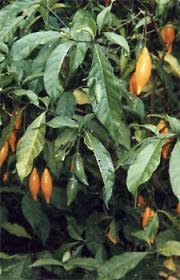 New studies reaffirm plant’s ability to halt cravings, however, one subject dies during the experiment
New studies reaffirm plant’s ability to halt cravings, however, one subject dies during the experiment The results of two observational studies into treating opioid dependence with ibogaine, a naturally occurring psychedelic compound derived from the West African Tabernanthe iboga plant, have been published in the peer-reviewed American Journal of Drug and Alcohol Abuse.
Sponsored by the non-profit Multidisciplinary Association for Psychedelic Studies (MAPS) in Mexico and New Zealand, both studies show that a single treatment of ibogaine, for reasons unknown, halts opioid withdrawal and cravings for heroin, cocaine, nicotine and alcohol in many subjects unsuccessful during previous drug rehabilitation attempts.
In the Mexico study, 12 out of 30 participants reported 75 percent reductions in their drug use 30 days following treatment, and 33 percent reported no opioid use three months later. The paper is co-authored by Thomas Kingsley Brown, Ph.D. (University of California, San Diego) and Kenneth Alper, Ph.D. (New York University School of Medicine).
As one participant in the Mexico study reported: “Iboga could give an opiate addict several months to half a year of freedom from craving, and a period of time in which to get their life together and learn to face things straightforwardly, directly and honestly. Iboga will not do the work for you.”
The New Zealand study, published on April 12, showed that a single ibogaine treatment could reduce opioid withdrawal symptoms and achieve either cessation from opioids or sustained, reduced use for up to 12 months following treatment. The results indicate that ibogaine may have a significant pharmacological effect on opiate withdrawal. In animals, a single dose of ibogaine decreases signs of opioid withdrawal and produces sustained reductions in the self-administration of heroin, morphine, cocaine, nicotine and alcohol.
All participants in the study described their ibogaine experience in positive terms, except that is, for one who died. The paradox of ibogaine is that higher doses tend to be more therapeutic in halting addiction, but those same high doses can cause cardiac problems in a small number of subjects.
MAPS acknowledged the potential shortcoming of ibogaine treatment due to instances of death, especially in non-medical settings, specifically concerns about potential cardiovascular complications related to ibogaine’s metabolism in the body.
In the New Zealand study, the physician on watch over the subject who died was “adjudged to have failed in their duty of care” through a failure to appropriately monitor the patient, according to a second investigation into the death.
MAPS researchers believe in spite of the single death, the studies bolster the case for further research in a highly supervised environment where any subject incurring a bad reaction can be treated immediately.
Ibogaine is illegal in the U.S., and legal but unregulated in Canada and Mexico. New Zealand, South Africa, and Brazil authorize the use of ibogaine by licensed medical practitioners. There is a large underground medicinal trade utilizing the plant for treatment of addiction.
A therapeutic dose of the drug causes a 24-hour altered state of consciousness, which many patients report forces self-examination of their entire life history. It is not known how closely the psychological and physical reactions to the drug work together in helping some addicts.
There is other research ongoing that looks to find whether it’s possible to isolate what property in ibogaine interrupts addiction and if that can be separated from its psychoactive properties and/or the tendency to cause cardiovascular distress in some persons.
PRIMARY SOURCE: MAPS

You must be logged in to post a comment Login